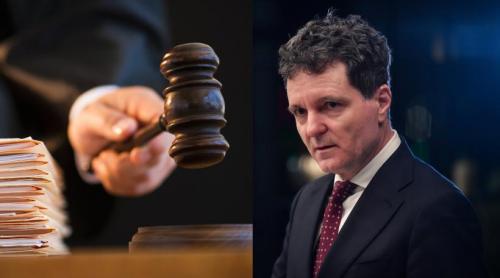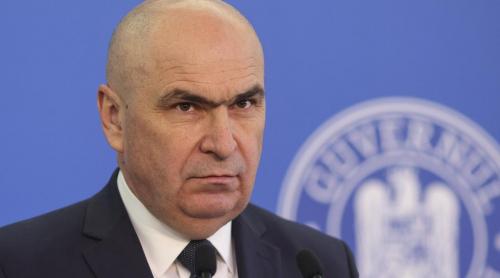
SPECIAL - March 4th 2005
Fifteen years since the demise of Communism had passed and the former Romanian intelligence officers who defected to the West are still regarded by the Romanian judiciary to be traitors. There are a few exceptions: Ion Mihai Pacepa and Liviu Turcu. The rulings which condemned them to death are ignored, of course, [but those regarding the confiscation of their personal wealth are maintained.]
By RAZVAN BELCIUGANU
 |
Gen. Pacepa had his military rank and honor restored, but so deserves his other colleagues.
Though having death penalties hanging over their heads and being called traitors by their former colleagues, these people worked for the demise of Communism. In the years that followed the 1989 Revolution it was alleged that some of these people "defected" on order from their bosses, [n order to intoxicate the Western intelligence services.]
Aware of this possibility, Jurnalul National still puts forth some hypotheses, while the files of the Foreign Intelligence Service still stay classified.
So, we may assume that these intelligence officers left their families behind, sometimes two or three children, and opted to defect because they understood that they were not serving their country but a dictator. Or maybe not. Maybe they indeed left their families behind on an official mission. The mission could have been for a large number of them to "defect" after Pacepa in order to counter his information with fabricated information that carried equal credibility. Or, it may be that the Foreign Intelligence Service took on a policy of its own: that of sending intelligence officers under the cover of defection to work in fact as liaison officers with the other intelligence services, in order to bring down the dictatorship. If we give credit to this last version, when hiring Carlos the Jackal to do a job the Foreign Intelligence Service could have dealt with using its own people, the Service was in fact throwing a smoke-screen to disclose its rapprochement with the Western services from their Soviet partners and Ceausescu alike.
Privately, Western officials talk about the cooperation among the Romanian and Western secret services from the times of the Ceausescuâs dictatorship. It is obvious that the intelligence officers working abroad were in the best position to assess the widening gap between the communist and the capitalist camps. So far none of the parties came forth publicly to share what they might have known. But one thing is certain: the former intelligence officers are still under the power of the rulings passed in Communist Romania. It is the duty of the Romanian society to debate their case and the duty of the judiciary to act accordingly.
And each of these cases deserves our attention:
As president of the Court served Col. Valeriu Sitaru; judge Col. Mircea Galatiuc, Col. Vasile Capusan, Col. Aurel Ciucu; Lt. Col. Constantin Niculescu, and prosecutor Col. Mihai Stefanescu and registrar warrant officer Romil Plesu.
1st Lt. Dan Stefanescu was born in 1950 in Bucuresti. The Local Military Court passed Ruling 25/25.05.1981 in file 237/1981, stating that "On 24 January 1981 he was sent to England on a mission, carrying top-secret documents that he was to deliver to the Romanian embassy in London. Once in London he went straight to the police, where he handed over the top-secret documents and asked for political asylum. He also refused to come back home and was also deemed a traitor, as he did not show up in three days to work. His deeds are proved at page 2 in the file, were it was stated that he handed over to the foreign police the classified files and refused to return to Romania. Also appended is the order passed by his military unit, who deemed him a traitor for failing to report for duty. (â¦) The Court ruled unanimously to sentence him to death, full confiscation of personal wealth and two separate sentences of seven years in prison each for refusing to come back home and for desertion. Decree 11 of 1988 changed the death penalty to 20 years in prison and granted an amnesty for the crimes punished by seven years in prison each.
As president of the Court served Col. Valeriu Sitaru; judge Col. Mircea Galatiuc, Col. Vasile Capusan, Col. Aurel Ciucu; Lt. Col. Constantin Niculescu, and prosecutor Col. Mihai Stefanescu and registrar warrant officer Romil Plesu.
Capt. Ovidiu Tanasescu was born in 1941, in Rm. Sarat city, Buzau County. He was an officer with UM 0503 military unit when he decided to leave the country. He was not married.
According to Ruling 124/28.12.1981 in file 508/1981, passed by the Local Military Court, "when on a mission at the Romanian Embassy in Sweden, he left his position and refused to report back to week, thus being declared a deserter, after failed to get back to work in three days time. When leaving his workplace he stole some top-secret documents which he passed on the Swedish Intelligence Service. The facts are proved at page 2 in the file and with the military unit order to state that he was a traitor (â¦). The Court unanimously ruled to sentence him to death and full confiscation of his entire personal wealth, plus seven years for failing to report back to work and for desertion.
As president of the Court served Col. Valeriu Sitaru; judge Col. Mircea Galatiuc, Col. Vasile Ilie, Col. Paul Balaban; Lt. Col. Florea Stancila, and prosecutor Col. Radu Ivan and registrar warrant officer Romil Plesu.
Citește pe Antena3.ro

















